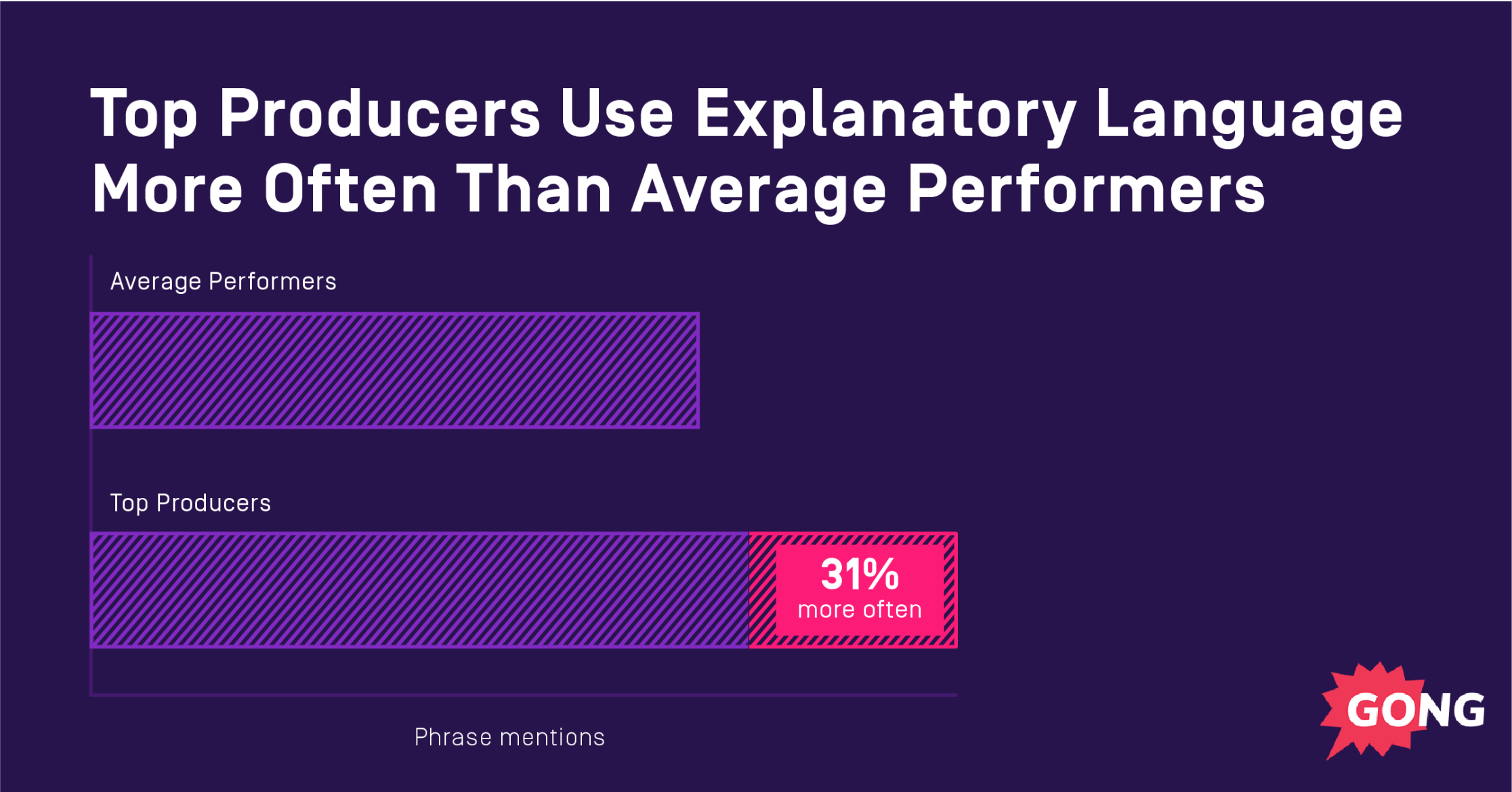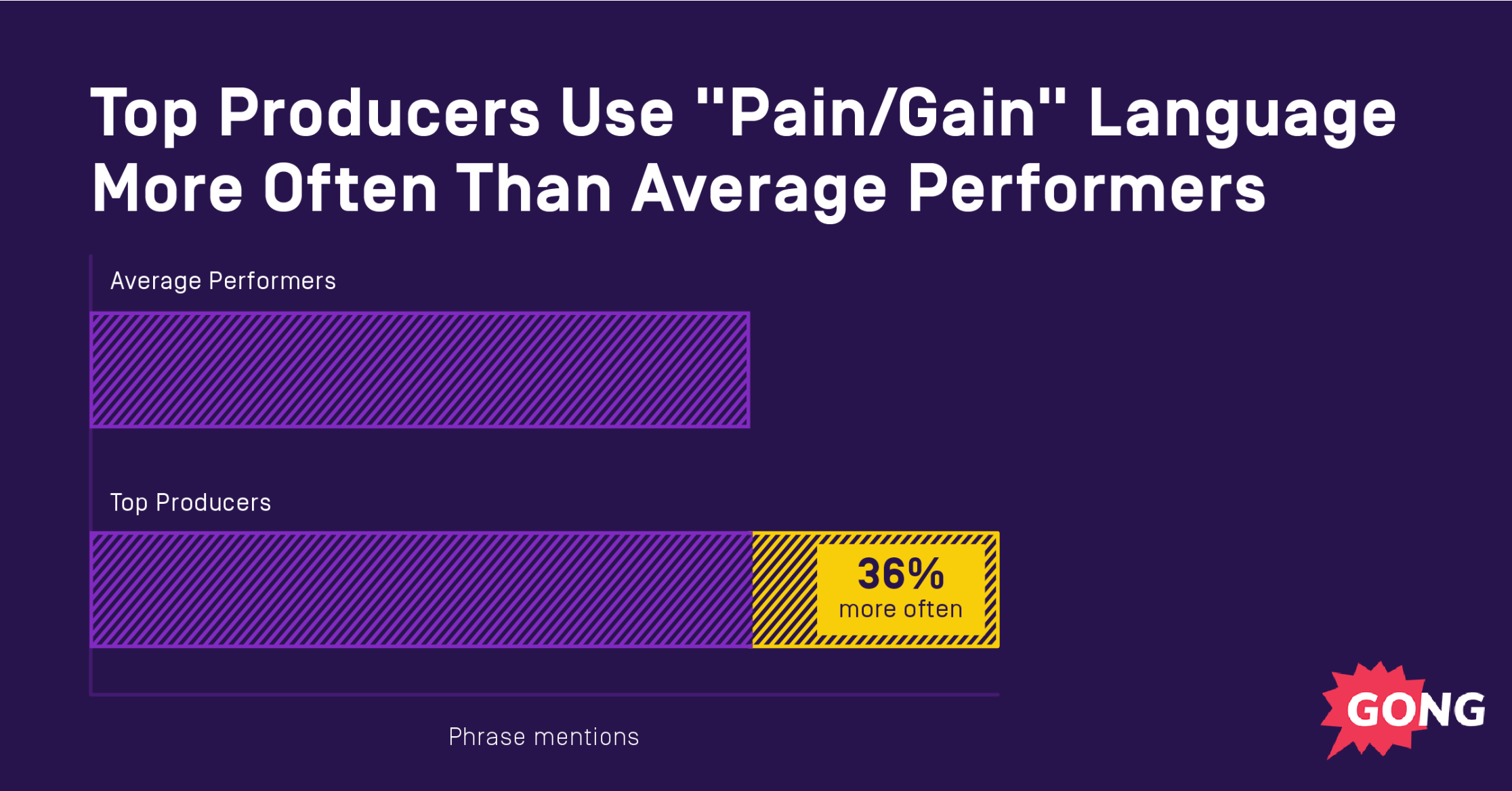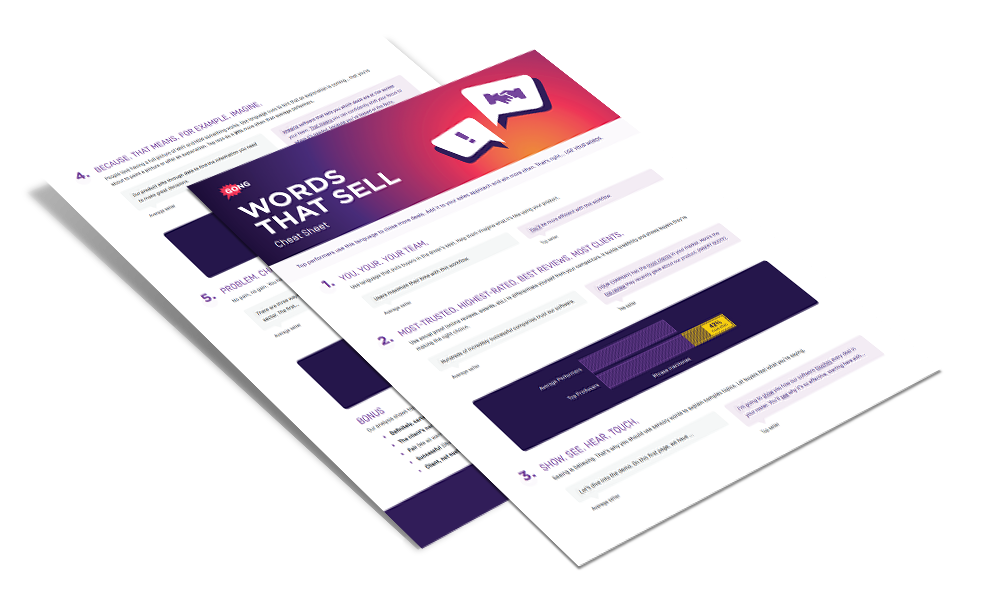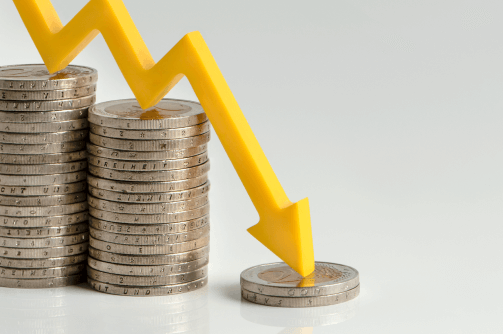Words and phrases to win more deals: how to become a top performer
This article is part of the Gong Labs series, where I publish findings from our data research team. We analyze sales conversations and deals using AI, then share the results to help you win more deals. Follow me to read upcoming research.
Quick quiz: Which of the following describes the top sales reps at your organization?
A: They show up early and leave late.
B: They are veterans with years and years of sales experience.
C: They are the hardest workers.
Yes.
Yes.
Yes.
All of these ring true for the best salespeople.
Turns out, time spent on your craft, experience, and hard work all contribute to success, regardless of industry or job type.
But in sales, there’s a hidden game-changer that puts the best reps over the top: the language they use.
The words that top producers choose and how they position their solution may seem subtle, but it has a HUGE impact on their success.
In true Gong fashion, we looked at the numbers to understand which phrases top performers use to exceed quota.
If you want to climb to the top of the leaderboard (or stay there), add these words and phrases to your calls today.
Sidebar: What is Gong Labs?
Before we dive into some next-level number crunching, here’s a quick explanation of how we get our data at Gong Labs.
We gather (anonymized) B2B sales interactions from our product users, including everything captured by Gong’s Revenue Intelligence platform: web conference meetings, phone calls, and emails. Then we analyze how seller and buyer actions impact win rates.
For this post, we analyzed over 500,000 sales calls and uncovered which words and phrases top performers use on the regular.
(PS: Want the full list of deal-making words and phrases? Download the Cheat Sheet for free).
#1: You. Your. Your team.
Hey, you. Yeah, you. I’m talking to you!
Salespeople are direct. Sometimes too direct.
And top salespeople? Fuggedaboutit. They take directness to a new level.
The best sales reps speak directly to buyers by using the pronouns you, your, and your team 29% more often than their average and underperforming peers.
Average seller: “Users maximize their time with this workflow.”
Top seller: “You’ll be more efficient with this workflow.”
Average seller: “Our clients use these insights to improve competitive win rates .”
Top seller: “You’ll improve competitive win rates with these insights.”
Feel the difference? One word. Huge impact.
The top sellers’ examples are direct, personal, and pack a punch.
The average sellers’ examples are generic, indirect, and ultimately, less persuasive. They rely on vague, unnamed people your buyer has never met. Who are they? Your buyer doesn’t know. And admit it, you don’t know either.
And because your buyer can’t visualize the who, they can’t conceptualize the how… as in, how it will work for them personally.
You want to make it personal and put your buyer in the driver’s seat.
(See what I did there?)
#2: Most-trusted. Top award. Best reviews. Highest-rated.
Yelp! Amazon reviews. Influencers. Pretty much any online retailer in 2020.
The one thing all these companies and platforms have in common is a strong reliance on social proof—reviews, ratings, awards.
Salespeople also use social proof all the time… think case studies, website testimonials, logos in presentation decks, reference calls, and so on.
There are at least a dozen books and hundreds of thousands of Google search results on WHY social proof works. Tl;dr: It creates a bandwagon effect, and people love belonging to a group.
That’s why it’s such an important aspect of selling to B2B buyers. (As long as you use it correctly. Read more about the right way to use social proof here.)
It doesn’t matter if your buyer is looking for the best hot wings in their city or researching the highest-rated sales tech for their team. They want to know they’re making the best decision. And the power of social proof moves them forward. (Lookin’ at you, G2, Quora, TrustPilot.)
Top sales performers know this, and they don’t leave those reviews on the web—they bring social proof into their talk tracks 42% more often than average sales reps.
Words and phrases such as awards, ratings, reviews, highest-rated, most-trusted, and most clients, are closely tied to social proof conversations.
In a world where differentiation is critical, top performers include social proof as a way to say, “You’re not alone; you’re making the right choice.”
Sure beats, “Trust me, I’m in sales.”
#3: Imagine. That means. For example. Because.
There is something powerful about the word imagine.
As we wrote back in 2017, when it’s used properly, the word imagine allows your prospects to “experience a real rush of excitement and adrenaline as you paint a picture of a compelling future…”.
And Gong Labs has the data to prove that explanatory terms such as imagine, which means, that means, for example, and because have a positive impact on closing deals.
Why? Because people love knowing, well… WHY.
Humans want to understand the meaning behind actions. They want to know why something happened or why it should happen.
You give them that by painting a picture of what happened when others bought your product, or what will happen when they buy your product.
The words listed in this section signal to a buyer that you’re about to offer them an explanation.
That’s why the top reps use these words and phrases 31% more often than average performers.
“Full visibility into your pipeline is critical today because without it your forecast is more like a guessing game.”
“…data and analytics at your fingertips, which means you don’t need to hire a data scientist.”
“For example, let’s say you use a product that alerts you every time a rep says imagine.”
All these statements help paint pictures, which means winning (more) deals.
#4: Show. See. Hear. Touch.
Our senses help us understand our world.
So it only makes sense that salespeople rely on them to explain complex issues.
Particularly in today’s COVID-world, video chats mean that visual and auditory cues are at the front of the pack in terms of importance.
Gong data revealed that top reps use sensory words—especially those involving sight and sound—36% more frequently than the average salesperson.
Here are a few examples of how our Gong reps deliver sensory-word statements:
“As you can see from the Gong data, it’s clear that top reps use sensory words more often than average reps.”
“I’m happy to show you some examples of how Gong solves that issue.”
“With Gong recordings, you can hear what reps are saying. No need to guess or make assumptions”
“Gong touches every system your team uses to communicate with buyers, so you never miss an interaction.”
Leveraging the human senses during sales calls is powerful.
You can feel the difference.
You can see the difference.
You can hear the difference.
(And if you’d like, someone from our team will be more than happy to show you the difference.)
#5: Problem. Challenge. Solution. Opportunity.
No pain, no gain.
Salespeople know they need to uncover their buyer’s pain before they can resolve it with an amazing product or service.
That’s why the best of the best sellers use pain/gain words such as problem, challenge, solution, and opportunity 36% more often than average sellers.
The best reps set up discovery calls to identify the problem and clarify the buyer’s challenge. Once they uncover that pain, they leverage it to propose their solution. It’s an opportunity to transform the negative into a positive.
And that’s how it’s done.
Win more deals with these words and phrases TODAY
Ready to level up? Word up.
That’s right. Your verbal game matters and it’s so easy to make improvements. Drop a YOU, SEE, or BECAUSE in just the right places and your conversations will be more effective than ever.
Make this list part of your daily routine by downloading the Words that Sell Cheat Sheet. Then *air* five everyone on your team.
BTW: If you’re a Gong client, you have full visibility into all these words – and more – right now. Here’s how to set up saved searches and alerts.





